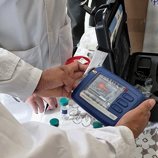 La Paz (Bolivia), 8 January 2020 - The United Nations Office on Drugs and Crime (UNODC) Country Office in Bolivia delivered two drug analyzers "TRUNARC" to the forensic laboratories of the Bolivian Antinarcotics Police (FELCN) on 23 December 2019, thanks to the donation of Global Affairs Canada. These electronic devices can detect hundreds of narcotics, controlled substances and chemicals within one to two minutes.
La Paz (Bolivia), 8 January 2020 - The United Nations Office on Drugs and Crime (UNODC) Country Office in Bolivia delivered two drug analyzers "TRUNARC" to the forensic laboratories of the Bolivian Antinarcotics Police (FELCN) on 23 December 2019, thanks to the donation of Global Affairs Canada. These electronic devices can detect hundreds of narcotics, controlled substances and chemicals within one to two minutes.
This donation was made as a strategic response to the growing threat of synthetic drugs, particularly amphetamine-type stimulants (ATS) and new psychoactive substances (NSP). The Laboratory and Scientific Affairs Section of UNODC launched the Global Synthetic Drug Monitoring Programme: Analysis, Reports and Trends (SMART) in 2008. The Global SMART Programme aims to help governments improve their capacity to generate, manage, analyze and communicate information on synthetic drugs, especially ATS and NSP.
The ceremony was attended by the Vice-Minister of Social Defense and Controlled Substances, Jaime Zamora; the Vice-Minister of Internal Affairs, Daniel Humerez; the Commander of the Bolivian Antinarcotics Police (FELCN), Cnl. Javier Maldonado; the UNODC's Representative, Thierry Rostan, and the Vice Consul of Canada, Melissa Cardinal.
With the purpose of protecting the health of people in the region, UNODC supports the countries of the region through quality assurance programs for forensic laboratories, forensic capacity building workshops and the provision of modern technology to identify new toxic substances.
Bolivia also benefits from UNODC's technical assistance to the forensic laboratories that participate in the global programme International Collaboration Exercise (ICE), in order to strengthen their capacities in the analysis of natural and synthetic drugs. In addition, UNODC delivered specialized literature related to these laboratories and trained its experts in the UNODC laboratories in Vienna.
In the last ten years, 14 countries and territories in Latin America and the Caribbean have reported 178 different new psychoactive substances (NPS) belonging to various chemical groups.
Current activities of the Global SMART Programme in Latin America and the Caribbean already cover 20 countries. Each of these countries will receive a donation of two portable drug analyzer devices. One of them must be awarded to a national security entity that represents the main points of entry into the country (airport, seaport or border areas) and the other to a forensic laboratory that cooperates directly with the designated national security entity. These institutions will be nominated by their respective governments.
The aforementioned donations will be preceded by a forensic training workshop organized by UNODC to train participants on the use of the device, trends and new developments related to ATS and NSP and to contribute to early warning mechanisms nationwide, regional and international.
****
La UNODC entregó sofisticados analizadores de drogas a laboratorios forenses de la FELCN